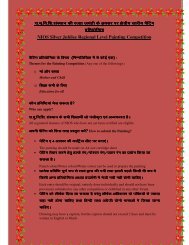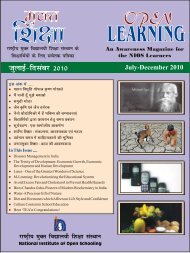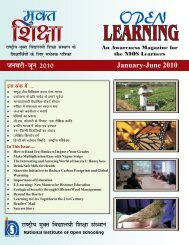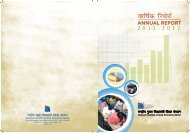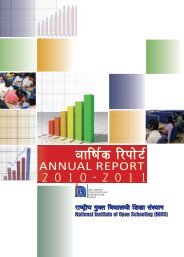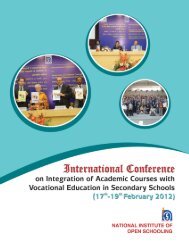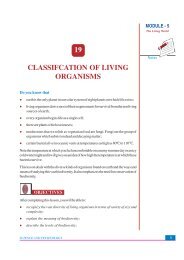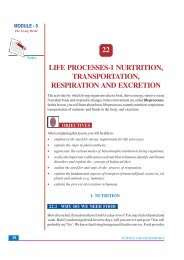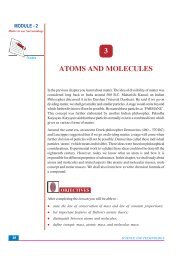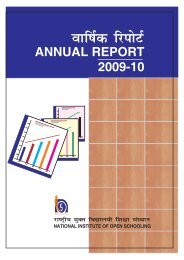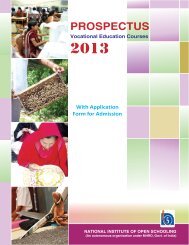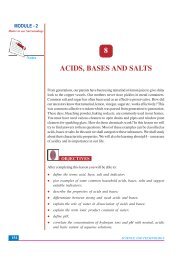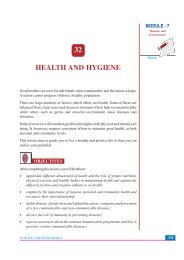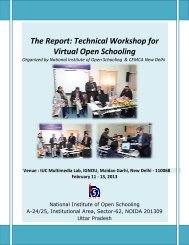Prospectus - The National Institute of Open Schooling
Prospectus - The National Institute of Open Schooling
Prospectus - The National Institute of Open Schooling
Create successful ePaper yourself
Turn your PDF publications into a flip-book with our unique Google optimized e-Paper software.
1<br />
NIOS:<br />
A <strong>Schooling</strong> System<br />
with a Difference<br />
<strong>The</strong> <strong>National</strong> <strong>Institute</strong> <strong>of</strong> <strong>Open</strong> <strong>Schooling</strong> (NIOS) was set up as <strong>National</strong> <strong>Open</strong> School in 1989 by the<br />
Ministry <strong>of</strong> Human Resource Development, Government <strong>of</strong> India, as an autonomous organisation. It<br />
provides educational opportunities to persons like you who wish to study further and qualify for a<br />
better tomorrow. <strong>The</strong> Mission <strong>of</strong> NIOS is to provide education to all with special concern for girls and<br />
women, rural youth, working men and women, SC and ST, differently abled persons and other<br />
disadvantaged persons who because <strong>of</strong> one or other reason could not continue their education with the<br />
formal system. NIOS operates through a network <strong>of</strong> Fourteen Regional Centres, Two Sub-Regional<br />
Centres and about three thousand Accredited Institutions (AIs) and Accredited Vocational Institutions<br />
(AVIs) commonly known as Study Centres in India, Nepal and Middle East Countries. For academic<br />
courses, admission is through On-line only.<br />
1.1 Features and Flexibilities in NIOS<br />
<br />
Age Limit: <strong>The</strong>re is no upper age limit for admission. However, the minimum age for enrolment is<br />
14 years for Secondary course and 15 years for Senior Secondary course as per information given<br />
in the entry requirements at Table-3.<br />
<br />
Choice in Medium <strong>of</strong> Instructions:<br />
Hindi, English, Urdu, Marathi, Telugu, Gujarati, Malayalam and Oriya mediums at Secondary<br />
stage.<br />
Hindi, English, Urdu mediums at Sr. Secondary stage.<br />
<br />
Choice <strong>of</strong> Subjects: You can choose any subject combination from a list <strong>of</strong> subjects <strong>of</strong>fered as per<br />
the criteria given in the Scheme <strong>of</strong> Studies at Table-I.<br />
<br />
<br />
<br />
NOTE<br />
You should think and<br />
choose your subjects<br />
carefully keeping in view<br />
your plans for higher<br />
studies, specific jobs, and<br />
requirement <strong>of</strong> the<br />
concerned Board, etc.<br />
If you wish to use NIOS certificate for higher studies, it is in your own<br />
interest that you keep in mind the requirements <strong>of</strong> the Boards/Universities<br />
you wish to join after passing Secondary/Senior Secondary course from NIOS.<br />
Some Boards / Universities require specific subject combinations for admission<br />
to the Institutions affiliated to them as given in the Appendices A & B. For<br />
example, for medical course, various institutes will expect you to have passed<br />
with a combination <strong>of</strong> Chemistry, Physics and Biology along with two<br />
languages. <strong>The</strong> learners who wish to join formal school board in class XI<br />
after passing NIOS examination <strong>of</strong> class X may opt for subjects combinations<br />
(in 5 or 6 subjects as the case may be) which are acceptable in class XI by<br />
such formal school Board,without prejudice to the rights <strong>of</strong> NIOS.<br />
Additional Subjects : You can also select one or two additional subject(s) either at the time <strong>of</strong><br />
admission or during the course <strong>of</strong> study, if you so desire or if it is required.<br />
Combination <strong>of</strong> Academic and Vocational Courses : In order to make the NIOS courses more<br />
meaningful, a number <strong>of</strong> Vocational Courses are also <strong>of</strong>fered in combination with academic subjects<br />
at the Secondary and Senior Secondary level (Refer Table 2). <strong>The</strong>se Vocational courses have to<br />
be taken in Accredited Vocational Institutions (AVIs). For more details please refer to the <strong>Prospectus</strong><br />
for Vocational Courses.<br />
Continuous Assessment : During your course <strong>of</strong> study, you will know your progress through<br />
Tutor Marked Assignments (TMAs).<br />
1 <strong>Prospectus</strong> 2011-12



